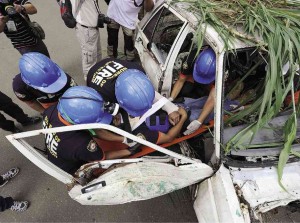Baguio simulates 1990 quake for the young to learn

RESCUE workers and members of the Baguio Fire Department simulate a fire and rescue of actors on the 23rd anniversary of the 1990 Baguio earthquake at Burnham Park. EV ESPIRITU/INQUIRER NORTHERN LUZON
BAGUIO CITY, Philippines—The summer capital is now dominated by migrants and a younger generation of residents who learned of the July 16, 1990 earthquake only from anecdotes and scary stories.
So the city government simulated earthquake alerts in downtown Baguio on Tuesday, froze traffic for a few minutes and allowed a few people to scamper to the streets as heavy rains poured.
The exercise helped older Baguio folk recall the tragedy that devastated Baguio 23 years ago although the activity was directed at younger residents who may not be prepared for another strong earthquake, city officials said.
Mayor Mauricio Domogan said Baguio still prays for the more than 1,000 people who died when the magnitude 7.7 quake struck in the afternoon of July 16, 1990, toppling buildings and splitting roads here.
The quake isolated Baguio for months and the community had to ration its resources, drawing fresh supplies from Metro Manila which were delivered by helicopters and planes. Many people also camped out at Burnham Park.
Domogan, then a councilor, said he made sure his family was safe before he scampered out to see what the quake had damaged. What he saw horrified him.
“If there was one thing that would make you cry, this was it. I went to Baguio Park View Hotel which toppled like an accordion, and I heard people who were trapped inside screaming in pain and fear and I could not do anything for them. I went to Hyatt Hotel and then Nevada Hotel and saw people trapped as well, screaming for help,” he said on Tuesday.
All the damaged hotels he spoke about were never rebuilt.
Domogan said most residents have moved on, but the one lesson about the tragedy that Baguio should never forget was it brought people together.
He said national media reports had written off Baguio, saying the quake had left the summer capital a broken city that was beyond repair.
“But we cooperated. We rebuilt our city. We were all part of the teamwork that drew the notice of Malacañang,” he said.
When the national government realized that residents were fighting to save the city, it poured resources to help them restore Baguio, spending up to P650 million, he said. Vincent Cabreza, Inquirer Northern Luzon